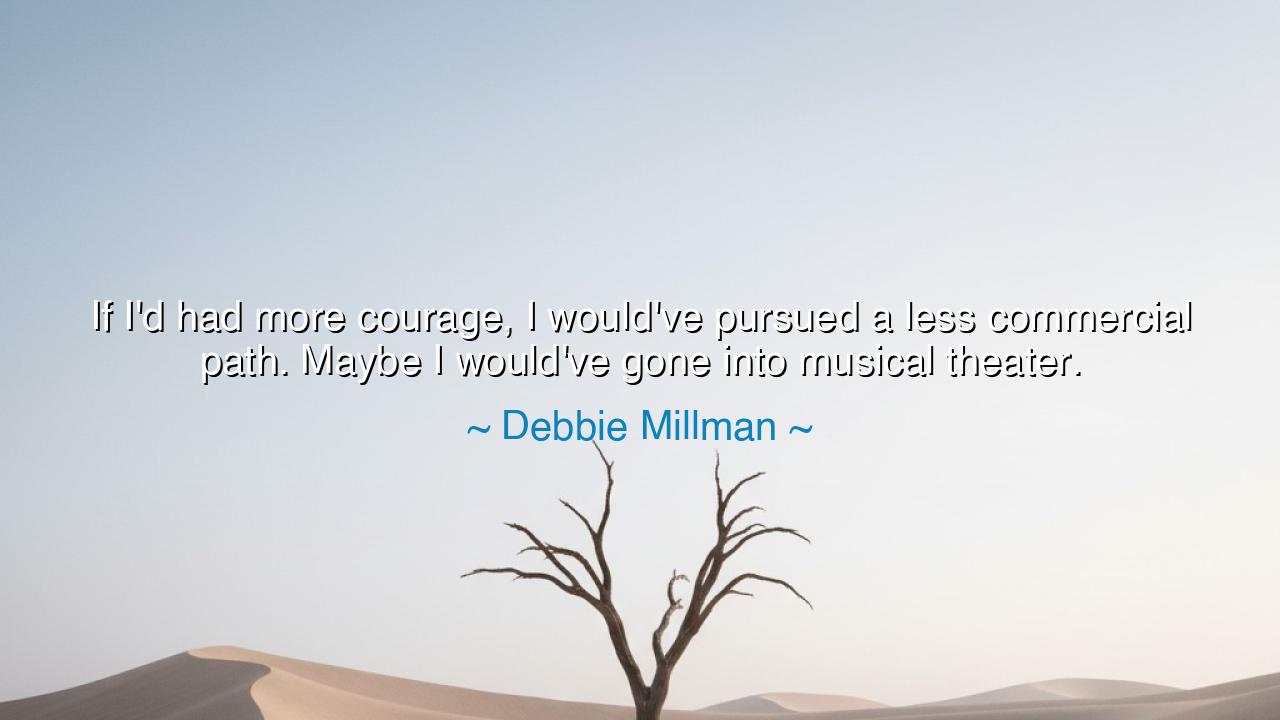
If I'd had more courage, I would've pursued a less commercial
If I'd had more courage, I would've pursued a less commercial path. Maybe I would've gone into musical theater.






The artist and philosopher Debbie Millman, whose voice has inspired generations of creators to examine the depths of their ambition and fear, once confessed: “If I'd had more courage, I would've pursued a less commercial path. Maybe I would've gone into musical theater.” These words, gentle yet filled with longing, are not merely a reflection on a career—they are a meditation on the eternal struggle between security and authenticity, between the comfort of success and the calling of the soul. In this admission, Millman reveals a truth known to all who walk the creative path: that courage is not only needed to face failure—but also to follow the heart against the gravity of expectation.
To understand her meaning, one must first understand the weight of commercial success. In a world that prizes recognition, wealth, and prestige, many talented souls learn to mold their art into something safe, something acceptable to the marketplace. They climb high, yet feel hollow; they achieve, yet remain unfulfilled. Debbie Millman, a renowned designer, writer, and teacher, had achieved what many dream of—a brilliant career, influence, and acclaim. And yet, in her reflection lies the soft ache of what might have been—the dream of musical theater, a realm less predictable, less profitable, but more intimately tied to emotion, expression, and vulnerability. She knew that to pursue that dream would have required a different kind of bravery: the courage to risk comfort for the unknown, to follow joy even when the path was uncertain.
This struggle is as old as creation itself. The ancients told tales of artists and seekers torn between duty and desire. Consider the story of Vincent van Gogh, who, though tormented and poor, refused to paint what would sell. He painted what burned within him—the light of wheat fields, the sorrow of stars. He died believing himself a failure, yet his art outlived empires. Van Gogh had the courage that Millman spoke of—the courage to walk the lonely road of authenticity, to trust the soul’s whisper more than the crowd’s applause. Yet how many others, more cautious, more pragmatic, chose the safer path and buried their truest gifts beneath the soil of convention? Millman’s words echo for all of them—for all of us—like a gentle lament and a sacred warning.
The origin of this quote lies in Millman’s own reflection on her life’s choices, spoken in interviews and writings where she often explored the themes of fear and fulfillment. She has spent much of her career urging others to live with intention, to pursue not what is easy, but what is meaningful. And yet, even she—brilliant and accomplished—confesses to the quiet cost of choosing safety. This is what gives her words their power. For they remind us that courage is not a gift we are born with, but a decision we must renew daily. It is easier to adapt to the world than to confront it; easier to please others than to reveal our true desires. To live courageously, one must dare to disappoint the world in order to remain loyal to oneself.
The ancients might have called this the trial of the soul—the moment when one must choose between destiny and comfort. Those who choose destiny walk a harder road, but one illuminated by passion. Consider Amelia Earhart, who could have lived a quiet life, yet chose to fly into the sky’s uncertainty. Or Beethoven, who, though deaf and tormented, continued to compose the music of the heavens. Each of these souls could have chosen the easier way, but they refused. They had the courage that Millman wished for—not because they feared less, but because they acted despite fear. This is the essence of courage: not the absence of trembling, but the will to move through it.
In Millman’s reflection there is no bitterness, only wisdom. She does not regret her path, but uses her experience to awaken others. Her words remind us that the greatest sorrow is not failure, but the failure to try. To live well, one must risk loss; to create something true, one must risk rejection. Happiness does not arise from perfection or security, but from the alignment of one’s actions with one’s inner truth. To say, “I might have gone into musical theater,” is not merely to dream of songs unsung—it is to remind us that every person carries within them a secret stage, a part of the soul waiting for the courage to perform.
So, my children of the heart, take this lesson deeply: do not trade your authenticity for acceptance, nor your calling for comfort. The world may reward conformity, but the soul rewards truth. Listen closely to that quiet voice within—the one that whispers of art, of love, of what truly matters—and follow it, even if the path is uncertain. For in doing so, you will find a happiness that no title or paycheck can equal. As Debbie Millman teaches through her gentle confession, the measure of a life is not how safely it is lived, but how bravely it follows its truest song. And when you dare to live that song, you will discover what all great spirits know—that courage is the bridge between what you are and what you are meant to become.






AAdministratorAdministrator
Welcome, honored guests. Please leave a comment, we will respond soon